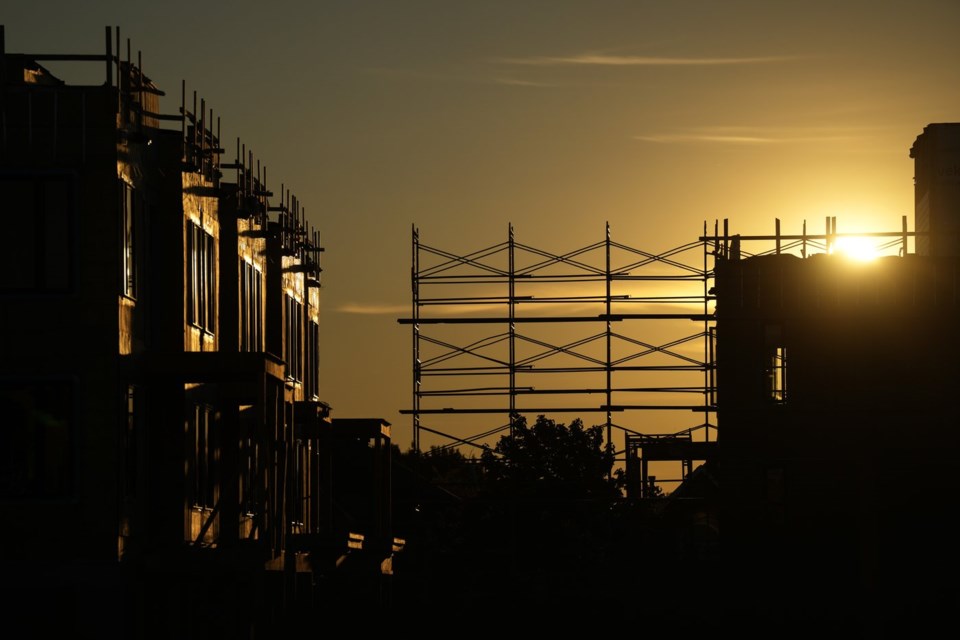TORONTO — Ontario's final tally for housing starts in 2024 is well off what's needed to achieve Premier Doug Ford's goal of getting 1.5 million homes built, even with various new categories the government is adding such as university dorms.
The government recently updated its housing tracker for the first time in eight months, and it provides yet another glimpse into home building struggles.
The total housing starts for 2024 by the government's calculations was 94,753. That includes 73,462 traditional housing starts, 14,381 additional residential units, 2,278 long-term care beds, 2,807 post-secondary student housing beds, and 1,825 retirement home suites.
But in order to meet the goal of 1.5 million homes built over 10 years by 2031, Ontario should have added 125,000 homes last year, with at least 150,000 this year and 175,000 the next. The province met its 110,000 target for 2023 after counting long-term care beds.
A spokesperson for Housing Minister Rob Flack said the government is seeing progress made through various funds it has established to help spur home construction.
"Our government is accelerating housing development, investing in infrastructure, and giving municipalities the tools they need to build more homes," Alexandra Sanita wrote in a statement. She also noted there were 9,125 rental housing starts.
But this year is so far not shaping up well either, as highlighted by the province's financial accountability officer, who flagged earlier this year that the starts for the first quarter of 2025 were at the lowest levels since 2009.
It's a reality that builders are seeing on the ground, said Dave Wilkes, president and CEO of the Building Industry and Land Development Association.
Home sales, a leading indicator of housing starts, are low and construction industry layoffs that have already started could see up to 40 per cent of the workforce axed, he said.
"The conditions that are in the marketplace right now really reflect the downturn that the industry saw in the early 1990s, so it’s the worst that it’s been in probably 35 years," Wilkes said.
The challenges are numerous and compounding, including the high cost to build and the low consumer confidence, he said. To help, the federal government could temporarily expand the GST/HST New Housing Rebate, and all levels of government can pull various levers to reduce development charges, Wilkes said.
The fees builders pay are used by municipalities to fund housing-enabling infrastructure such as water and sewer lines, but builders say the costs add too much to the price of a new home for the buyer, and cutting them will spur demand and construction.
The provincial government over the last few years has established various funds worth several billion dollars to help spur home construction, including money for municipalities to put toward housing-enabling infrastructure.
Ontario has tied one of them, the Building Faster Fund, to targets for housing starts the government has assigned 50 municipalities, with cities getting cash if they meet at least 80 per cent of their target.
The newly updated housing tracker data shows that last year, just 23 of them hit that threshold, down sharply from 32 the previous year.
Green Party Leader Mike Schreiner said one of the best ways the provincial government could stem the housing crisis would be to enable more gentle density in existing neighbourhoods, where infrastructure already exists. Ford has adamantly refused to automatically allow fourplexes to be built across the province, preferring to leave those zoning decisions up to individual municipalities.
Ontario could also standardize rules for modular housing and fund more affordable, non-profit, co-op and social housing, Schreiner said.
"The Ford government is presiding over the worst housing crisis in Ontario history, and have the worst housing numbers in Canada, and they're doing everything they can to not be transparent and honest with the people of Ontario about the extent of the crisis," he said.
"But the reality is, is we're feeling it in our day-to-day lives, because we have a whole generation of young people wondering if they'll ever be able to own a home."
This report by The Canadian Press was first published Aug. 11, 2025.
Allison Jones, The Canadian Press


